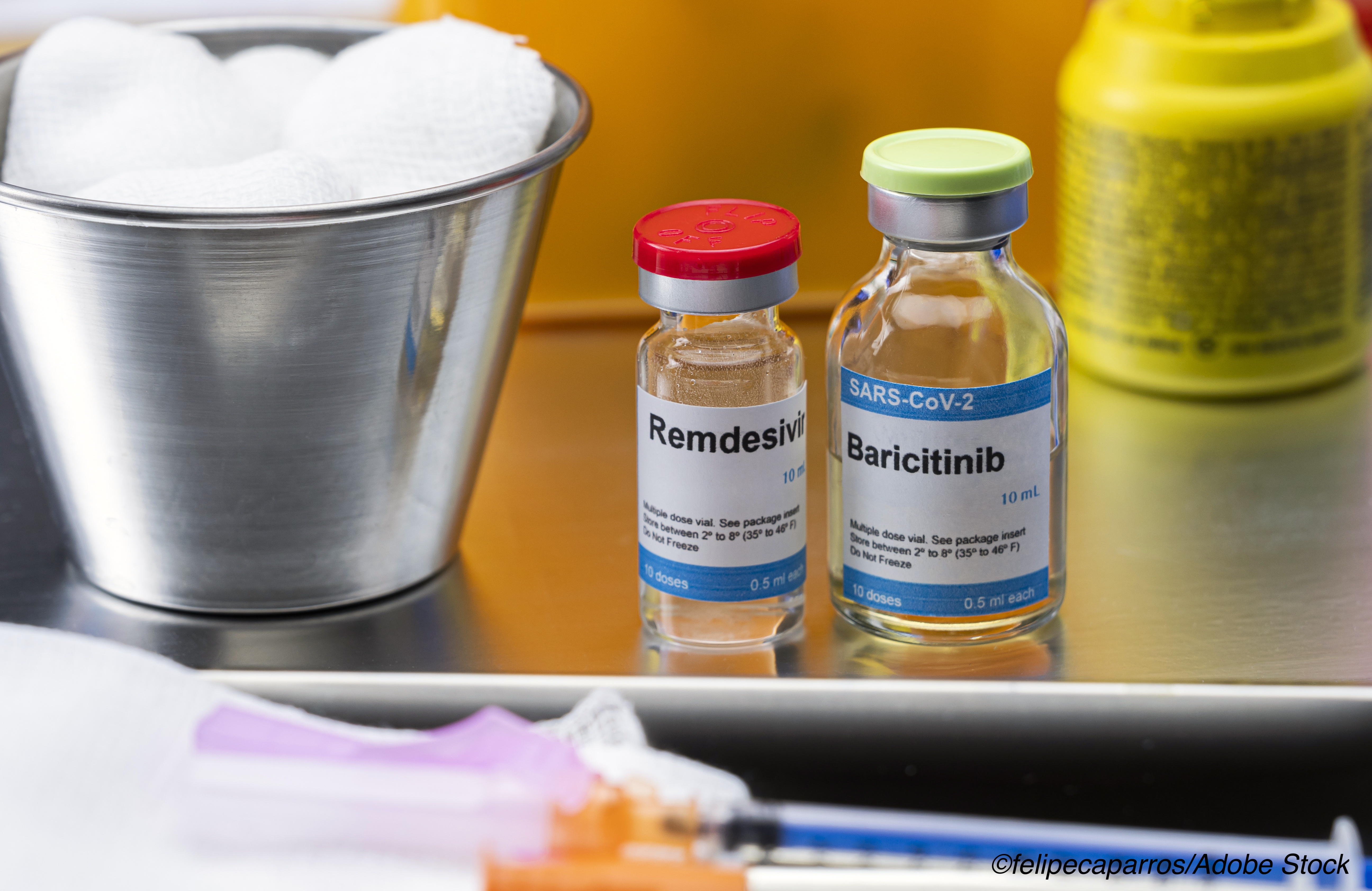Among patients hospitalized for Covid-19, adding the anti-inflammatory drug baricitinib to remdesivir was associated with reduced time to recovery and faster improvement in clinical status in a second phase of the pivotal Adaptive Covid-19 Treatment Trial (ACTT).
The median recovery time among hospitalized patients receiving remdesivir and baricitinib was 7 days in the ACTT-2 trial, compared to 8 days in patients treated with remdesivir and placebo.
The difference was most pronounced among patients receiving high-flow oxygen or non-invasive ventilation at enrollment. Median recovery times among these patients was 10 days in the dual active therapy group and 18 days in the remdesivir and placebo group.
And patients receiving the combination therapy had fewer serious adverse events, wrote researcher Andre C. Kalil, MD, of the University of Nebraska Medical Center, Omaha, and colleagues.
The ACTT-2 findings were published online Dec. 11 in The New England Journal of Medicine.
Findings from the first stage of the ACTT trial showed remdesivir alone to be superior to placebo in the treatment of patients with Covid-19-related pneumonia.
The second phase of the trial was conceived following the identification of baricitinib as a potential Covid-19 treatment by artificial intelligence algorithms. Several subsequent case studies suggested that treatment with the orally-administered, selective Janus kinase (JAK) 1 and 2 inhibitor improved oxygenation and reduced inflammatory markers.
“Baricitinib inhibits the intracellular signaling pathway of cytokines known to be elevated in severe Covid-19, including interleukin-2, interleukin-6, interleukin-10, interferon-γ, and granulocyte-macrophage colony-stimulating factor; acts against SARS-CoV-2 through the impairment of AP2-associated protein kinase 1 and the prevention of SARS-CoV-2 cellular entry and infectivity; and improves lymphocyte counts in patients with Covid-19,” the researchers wrote.
Enrollment in the double blind, placebo-controlled ACTT-2 trial began in early May and included 67 study sites in 8 countries (the U.S., Singapore, South Korea, Mexico, Japan, Spain, the United Kingdom, and Denmark).
All patients recruited for the trial were hospitalized for Covid-19 and all were treated with remdesivir for 10 or fewer days. Roughly half were also assigned to baricitinib, while the other half received placebo, for 14 or fewer days.
The primary outcome was time to recovery, and a key secondary outcome was clinical status at day 15.
A total of 1,033 patients were included in the trial, with 515 assigned to the combination treatment and 518 to the remdesivir plus placebo (control) arm. A total of 498 patients in the combination group and 495 in the control group completed the trial through day 29, recovered, or died.
The mean patient age was 55.4 years, 63% were male, 48% were White, and 327 had severe disease at enrollment requiring invasive or noninvasive ventilation.
Patients receiving the dual therapy had a 30% higher odds of improvement in clinical status by day 15 (odds ratio, 1.3; 95% CI, 1.0-1.6) and their median time to recovery was 1 day earlier (7 days versus 8 days; rate ratio for recovery, 1.16; 95% CI, 1.01-1.32; P=0.03).
Among the other main findings:
- Among patients receiving high-flow oxygen or non-invasive ventilation at enrollment, time to recovery was 10 days in the combination-treatment group and 18 days in the control group (rate ratio for recovery, 1.51; 95% CI, 1.10-2.08).
- 28-day mortality was 5.1% in the combination therapy group and 7.8% in the control group (hazard ratio for death, 0.65; 95% CI, 0.39-1.09).
- Serious adverse events occurred less often in the combination therapy group (16% versus 21%; difference, −5.0%; 95% CI, −9.8 to −0.3; P=0.03).
- The rate of new infections was also lower in the combination therapy group (5.9% versus 11.2%; difference, −5.3%, 95% CI, −8.7 to −1.9; P=0.003).
“The faster recovery in patients who received baricitinib plus remdesivir suggests that the combination treatment may have an effect in lowering the hospital-associated risk of nosocomial infections, thrombosis, and errors in hospital drug administration,” the researchers wrote. “Moreover, faster recovery also decreases the burden on the health care system, potentially increasing capacity, which is of critical importance during a surge of cases.”
They added that despite concerns about immunosuppression, secondary infections, and thrombosis associated with JAK inhibitor use, “the addition of baricitinib was not associated with a significantly higher incidence of adverse events or thromboembolic events. In fact, patients receiving baricitinib plus remdesivir had a significantly lower incidence of adverse events, adverse events leading to discontinuation of the trial drug, serious adverse events, serious adverse events with a fatal outcome and infection-related adverse events than patients who received remdesivir alone.”
In the RECOVERY trial, the anti-inflammatory corticosteroid dexamethasone was also shown to benefit hospitalized patients with Covid-19 on mechanical ventilation.
The researchers noted that the two anti-inflammatory drugs have important biologic differences, and RECOVERY and ACTT-2 had important design differences.
“The high mortality in the control group of the RECOVERY trial and the low mortality in the control group of ACTT-2 suggest that these trials might not be generalizable to the same patient population,” they wrote. “Only a randomized, double-blind, placebo-controlled, head-to-head comparison of baricitinib plus remdesivir with dexamethasone plus remdesivir will allow the efficacy and safety differences between these two approaches to be fully understood.”
- Among patients hospitalized for Covid-19, adding the anti-inflammatory drug baricitinib to remdesivir was associated with reduced time to recovery and faster improvement in clinical status.
- The difference was most pronounced among patients receiving high-flow oxygen or non-invasive ventilation at enrollment. Median recovery times among these patients was 10 days in the dual active therapy group and 18 days in the remdesivir and placebo group.
Salynn Boyles, Contributing Writer, BreakingMED™
Funding for the ACTT-2 trial was provided by the National Institute of Allergy and Infectious Diseases.
Corresponding researcher Andre Kalil reported no relevant disclosures.
Cat ID: 190
Topic ID: 79,190,190,926,192,927,151,928,925,934



